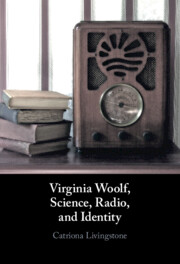Book contents
- Virginia Woolf, Science, Radio, and Identity
- Virginia Woolf, Science, Radio, and Identity
- Copyright page
- Contents
- Image
- Acknowledgements
- Abbreviations
- Introduction
- Chapter 1 Schrödinger’s Woolf
- Chapter 2 ‘Unity–Dispersity’
- Chapter 3 ‘Our Senses Have Widened’
- Chapter 4 Tigers under Our Hats
- Conclusion
- Bibliography
- Index
Chapter 4 - Tigers under Our Hats
Alternative Evolutionary Identities
Published online by Cambridge University Press: 10 February 2022
- Virginia Woolf, Science, Radio, and Identity
- Virginia Woolf, Science, Radio, and Identity
- Copyright page
- Contents
- Image
- Acknowledgements
- Abbreviations
- Introduction
- Chapter 1 Schrödinger’s Woolf
- Chapter 2 ‘Unity–Dispersity’
- Chapter 3 ‘Our Senses Have Widened’
- Chapter 4 Tigers under Our Hats
- Conclusion
- Bibliography
- Index
Summary
This chapter takes a broad view of evolutionary theory, exploring the divergent theories that abounded in the modernist period. The first section, ‘Tigers under Our Hats: Alternative Evolutionary Identities’, focuses on comparative anatomy, demonstrating that Between the Acts highlights the resemblances between human bodies and animal forms – and, in doing so, decentres a universalized upper-class, human identity. The second section, ‘“Embryo Lives”: Recapitulation Theory’, considers Woolf’s representations of individual development in The Waves, ‘On Being Ill’, and Orlando – specifically her focus on the continuity between the self and its hereditary past, and on the multiplicities of bodily identity. It demonstrates that the central conceit of Orlando can be linked to recapitulation theory; the novel is a biography of Vita Sackville-West which shows her to recapitulate the lives of her ancestors. The final section, ‘“Unacted Parts”: Creative Evolution’, highlights resonances between Flush and Henri Bergson’s evolutionary scheme, especially his argument that qualities lost over the course of evolutionary development still exist in a ‘latent’ state in the self. It concludes that, in Woolf’s later writing, engagement with the community is a means of recovering the ‘unacted part[s]’ that are lost over the course of a lifetime.
- Type
- Chapter
- Information
- Virginia Woolf, Science, Radio, and Identity , pp. 151 - 195Publisher: Cambridge University PressPrint publication year: 2022

